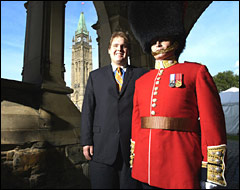Posted Sep. 1/05
For Ryan Androsoff, BPAPM/03, last winter will be forever seared into his memory.

- Ryan Androsoff, BPAPM/03, with a member of the Ceremonial Guard.
Instead of spending Christmas with family and friends, the advisor to International Cooperation Minister Aileen Carroll moved from one hot-button crisis to another, having no time in between to catch his breath.
The whirlwind of activity began when Ukraine’s Supreme Court issued a ruling that invalidated that nation’s presidential runoff election. Since Androsoff’s areas of responsibility include Central and Eastern Europe, he was plunged into the organizational effort that would send 500 Canadian observers to the region to monitor the repeat round of voting.
“With respect to international election observer missions, never before had we done something this large in such a short time frame,” he says of Canada’s contribution to the international Organization for Security and Cooperation in Europe election observer mission and the independent Canadian Observers Mission to Ukraine overseen by former Prime Minister John Turner.
Androsoff had to prepare for the minister’s announcement on the initiative, which came out just three days after the Supreme Court ruling. He and his colleagues at the Canadian International Development Agency (CIDA) coordinated efforts with counterparts from the Department of Foreign Affairs (FAC) to select, train, and send the 500 observers to Ukraine with only two weeks to put everything together. He also provided policy and political advice to Minister Carroll in the lead up to the December 26 vote.
That day, the Carleton grad had only a few hours to rest after Ukrainians went to the polls before other major news broke: a tsunami had hit the coastline of Indonesia and surrounding countries in the Indian Ocean.
Once again, Androsoff, who is also assigned to Asia, began coordinating with FAC and the Department of National Defence to launch an emergency response. In the next few days, Minister Carroll announced the federal government’s plans to match donations from Canadians to the tsunami relief efforts.
“There was an unprecedented amount of activity on this,” Androsoff says.
He later accompanied Minister Carroll to Jakarta, Indonesia’s capital, for a United Nations meeting on the tsunami crisis and the relief effort. Then it was on to Banda Aceh, one of the region’s hardest-hit areas, before departing for Switzerland to attend a United Nations pledging conference.
They flew into Banda Aceh in a Singaporean military helicopter.
“I remember when we landed on the airstrip field, it seemed like a scene from the Vietnam war or a war zone from M*A*S*H,” recalls Androsoff.
“There was an endless stream of helicopters and Hercules transport planes trying to land. There were tent villages with military and relief workers from across the world.”
The Canadian entourage visited a hospital where victims were being treated. They then travelled to a waterfront strip that was hit particularly hard. Androsoff noticed a 60-foot-long ship that lay idle in the middle of downtown, having been carried several kilometres inland by the tsunami.
Androsoff says the visit afforded him and other ministerial staff an insight into the situation that could never have been found in Ottawa.
“It helped us make better decisions. When we got back, there were relief and reconstruction proposals coming up to the minister’s office for approval.
It allows you to give better advice to the minister when you have been there. You have a greater sense and understanding of what the situation is like on the ground.”
The Geneva portion of the trip struck a special chord for Androsoff. During his time at Carleton, he was involved in the Carleton University Debating Society and the Carleton Model United Nations Association.
“To then be advising Canada’s Minister of International Cooperation at a real UN conference and to be sitting right behind her and the Canada placard as she delivered the Canadian statement in this UN assembly hall was a very special moment for me.”